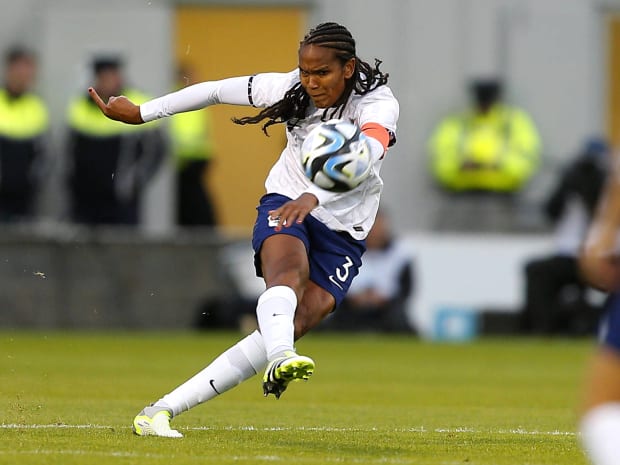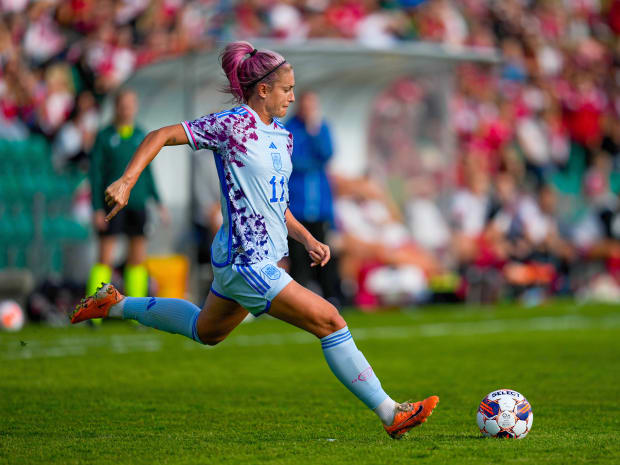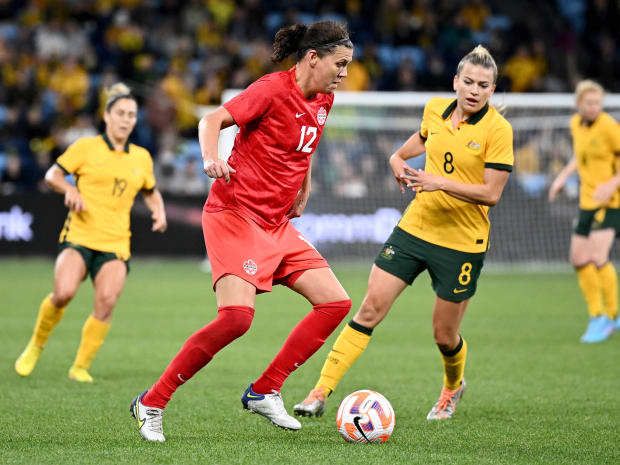The Women’s World Cup has never been bigger or better. As the women’s game continues to surge in popularity around the globe, this year’s tournament will feature an expanded bracket of 32 teams for the first time.
And could it also be the first time we see a three-peat champion? The U.S. women’s national team is looking to win a third straight title (and its fifth overall) as the world’s greatest squads head Down Under. But as other squads follow the U.S.’s lead in securing equality from their federations—and as the Americans navigate an era of transition—the competition will be fierce.
Here are five teams looking to steal the World Cup title from the USWNT.
Germany

IMAGO
As the only team outside of the USWNT to win back-to-back Women’s World Cups (2003, ’07), Germany is considered one of the giants of the sport. As such, it’s among the favorites in almost every major tournament. This World Cup is no exception—the German squad is stacked with an impressive roster ready to revive its previous dominance.
Of the group, perhaps no one has been more critical to Germany’s recent success than Lena Oberdorf. The 21-year-old plays for Frauen-Bundesliga’s Wolfsburg and made Germany’s 2019 World Cup roster at just 17. Fast forward four years, and Oberdorf has lived up to the great expectations. While she may not be the flashiest player—more defensive-leaning, she doesn’t consistently score goals—Oberdorf fills a vital role in the midfield, breaking up plays and distributing with precision. Against top teams, her ability to throw sand in the gears and halt the counterattack is invaluable.
Germany will also be anchored by seasoned veterans like Wolfsburg forward and captain Alexandra Popp, who spearheads the goal-scoring charge. If Popp can stay healthy (she missed the Euro 2022 final due to a muscular injury suffered during warmups), then consider the Germans one of the biggest attacking threats of the tournament. This squad should certainly be able to test the other favorites in any potential matchup come the final.
England

Paul Marriott/IMAGO
The Lionesses may well be the USWNT’s toughest adversary. The English squad has it all: balance at every position, a world-class manager with a winning history and, only recently, bragging rights. Last October at a sold-out Wembley Stadium, England defeated the U.S. for the first time since 2017. Though it was just a friendly, the 2–1 victory proved that the Lionesses could not only compete with the reigning world champs, but also had the depth to match them.
Much of England’s recent success can be attributed to manager Sarina Wiegman. Before taking the job in September 2021, the former University of North Carolina midfielder spent nearly five years at the helm of her native Netherlands, leading the Dutch to the Euro ’17 title and the ’19 World Cup final. Her impact: England went undefeated in Wiegman’s first 30 games at the helm, a streak that ended with a friendly loss to Australia in April. Last summer the Lionesses clinched England’s first European championship in an extra-time final against Germany, with Chloe Kelly writing her name in soccer history with her 110th-minute match winner and viral celebration.
England likely won’t get a chance to dethrone the U.S. until the final, and a daunting path awaits, with cohost Australia, Germany and France or Canada lying in wait.
France

IMAGO
Hervé Renard was appointed manager of Les Bleus just in March, but he wasted little time making his mark. The former manager of the Saudi Arabian men’s national team invited Wendie Renard (no relation)—who left the team in February in protest of previous manager Corinne Diacre—and all-time leading scorer Eugénie Le Sommer—whom Diacre had left off the squad—back into camp for April’s friendlies against Colombia and Canada. The invitation marked Le Sommer’s first appearance with France in nearly two years; the manager’s move paid off immediately, as the 33-year-old notched a brace in Les Bleus’ 5–2 win over Colombia.
Barring injury and off-field drama, France has some of the best players in the world, including 22-year-old Selma Bacha, who is dominant on the wing, and Renard, one of the best center backs. Of course it’s worth noting the squad is without Marie-Antoinette Katoto. PSG’s all-time leading goal scorer would have added a lethality to Les Bleus’ attack that could have been a game-changer.
Expect to see France play with a freedom it couldn’t muster under the scrutiny of hosting the 2019 World Cup, where Les Bleus lost to the U.S. in the quarterfinals. The team has plenty of big-tournament experience, with a roster dominated by veteran talent eager to avenge that ’19 exit in a possible final rematch against the Americans and send off a consequential generation in style.
Spain

Kim Price/IMAGO
Few squads possess a talent pool as deep as Spain, home to Barcelona—one of the biggest and boldest clubs in women’s soccer—from which La Roja are used to drawing much of their star power, including back-to-back Ballon d’Or winner Alexia Putellas. But a recent player protest has thrown Spain into turmoil.
In September the Spanish federation received emails from 15 national team players (Putellas, still recovering from an ACL injury, was not among them but expressed her support) saying they wouldn’t play unless manager Jorge Vilda was dismissed, citing reasons such as poor treatment, insufficient training and lack of tactical knowledge. Three of those players (Aitana Bonmatí, Ona Batlle and Mariona Caldentey) returned to the team for the World Cup.
Under Vilda, Spain has not always impressed, losing in the quarterfinals in the past two Euros and falling to the U.S. in the 2019 World Cup round of 16. But since the players’ protest, Spain has lost only once: to Australia in February’s Cup of Nations. Last October, without its brightest stars, Spain dominated the U.S. in a 2–0 friendly; La Roja could get another chance in the World Cup semifinals. Even if Spain is without some of its best players, its fast-paced and possession-based style will be enough to give any team trouble.
Canada

Dan Himbrechts/IMAGO
Canada enters the World Cup with persuasive credentials and some serious hardware following its gold medal run at the Tokyo Games. The team will need to shake off some recent disappointments, including a 2–1 loss to France in an April friendly and a 3–0 thumping by Japan in February’s SheBelieves Cup.
But under manager Bev Priestman, this squad has stepped up on the big stage. Deploying a methodical game plan, the 37-year-old has transformed the group since taking over in 2020. Priestman has plenty of young talent at her disposal, including Juventus’s Julia Grosso and Chelsea’s Jessie Fleming in the midfield. OL Reign striker Jordyn Huitema is another critical piece, energizing the team’s offense at just 22 years old. Of course, forward Christine Sinclair, who at 40 will be competing in her sixth World Cup, anchors the squad.
Canada’s back line is just as impressive as its attack, headlined by Lyon’s Vanessa Gilles and San Diego Wave’s Kailen Sheridan, one of the NWSL’s top goalkeepers. Canada may be considered a long shot compared to superpowers England, France and the U.S.—especially with the Americans out for revenge for their Olympic defeat—but count this team out at your own risk.







